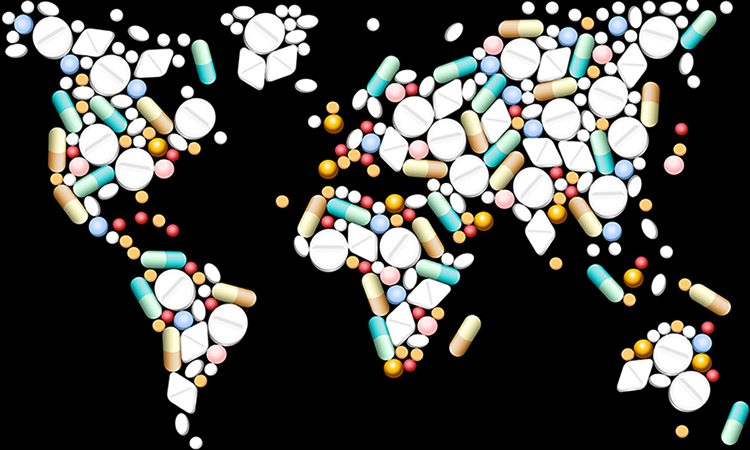Defining the ‘New World Order’ of supply chain security
Posted: 20 November 2019 | Allan Bowyer (TraceLink) | No comments yet
Now that prominent compliance deadlines are nearing in the US, Saudi Arabia and Russia and with the Falsified Medicines Directive (FMD) now in force in Europe, what is going on around the world with serialisation? Allan Bowyer provides a rundown of current events and shares insights into the challenges businesses are facing to meet compliance.


Serialisation of pharmaceutical products to increase the security and quality of drugs in the supply chain will soon be a foregone conclusion. Working along similar timelines, the US Food and Drug Administration (FDA), European Medicines Agency (EMA) and other medicines-regulating bodies including Russia’s Roszdravnadzor and Saudi Arabia’s Food and Drug Authority (SFDA) have made considerable strides in recent years in enacting track-and-trace legislation.
Russia is still a bear
Russian regulators are implementing what many believe to be the most extensive track-and-trace regulation in the world. This is largely due to the cryptographic codes companies must include in the 2D data matrix barcode on packaging labels for all covered medicines before 1 January 2020.
In addition to Russia’s unique cryptography requirements, companies are required to track a wide range of product movements, transfers of custody, operational events and packaging changes, including aggregation and reporting modifications in parent-child relationships, the complexity of which far exceeds the requirements of other global compliance regulations.
Russia’s two-year implementation timeline is also incredibly short, especially in comparison to the EU FMD’s six-year window and the Drug Supply Chain Security Act (DSCSA), which has a phased 10-year implementation timeline.
For organisations that manufacture a class of medicines known as the ‘12 Nosologies’, the timeline was even shorter, with the deadline passing on 1 October 2019. For reference, the 12 Nosologies are less common, but higher-cost, medical conditions and include:
- Haemophilia, cystic fibrosis, pituitary dwarfism, Gaucher disease, myeloid leukaemia, multiple sclerosis, immunosuppressive therapy for organ transplant patients, haemolytic-uremic syndrome, juvenile arthritis with systemic onset and mucopolysaccharidosis I, II and VI types.
Preparation for these organisations began immediately, since they were required to register with the government monitoring systems in early July and begin full-scale serialisation in October. Adding to the regulation’s complexity is the evolution of regulatory requirements and changes in technical guidelines for reporting events to the government system. It is thus crucial for businesses to maintain momentum in their implementations while keeping a watchful eye on these changes and managing uncertainty.
Regulations in Saudi Arabia
In November 2016, the SFDA published the latest version of the Saudi Drug Code (SDC). In their mission to protect the public against counterfeit drugs, lawmakers are confident the law will make Saudi’s drug supply chain safer and more efficient.
Companies needed to take steps to prepare for the SFDA aggregation requirement, even in the absence of final guidelines”
While Saudi reporting requirements have been in place since January 2019, product aggregation was only confirmed as a requirement one month later and a 1 October 2019 aggregation deadline was established for companies that manufacture and distribute medicines for the Saudi Arabia market. This means that each individual saleable unit of medicines must have an identity or data relationship to the case they are shipped in. However, the specific requirements around creating the aggregations and what needs to be captured and reported to the Saudi Arabia track-and-trace system – or shared with trading partners – were still not issued by SFDA in September, thus requiring industries to work closely with one another to ensure proper data exchange.
Aggregation without guidance
Some countries, such as Russia, require reporting on aggregation events in the supply chain – such as “unit pack” and “unit unpack” – as well as change of ownership events. It remains to be seen whether Saudi Arabia will require reporting on aggregation events in addition to reporting on the transfer of aggregated products.
Companies needed to take steps to prepare for the SFDA aggregation requirement, even in the absence of final guidelines. Their pre-aggregation assessment needed to focus on four aspects related to internal and external processes and partners:
- Identify affected products and packaging lines
- Understand GS1 requirements for case level aggregation
- Assess if your partners are “aggregation aware and enabled”
- Understand how you will exchange aggregation information with your trading partners.
Faced with a compressed timeline, companies could not afford to wait for final guidance before beginning preparations and it was important that companies understood how aggregation might affect their supply chain operations – and what steps they needed to take to be ready.


Saleable returns: provider expertise and platform is key
With less than one month until the November 2019 DSCSA Saleable Returns Verification (SRV) deadline, manufacturers and wholesalers are feeling the pressure to meet FDA requirements, satisfy the needs of their trading partners and seamlessly integrate product verification into their daily operations.
Saleable returns are estimated to represent approximately two percent of gross sales for wholesale distributors based on an annual volume of 59 million returns – nearly a quarter-million per day. Manufacturers who will need to handle hundreds of thousands of verification requests daily also have a significant stake in reducing the operational impact caused by inefficient, inconsistent saleable returns processes.
EU takes the lead
Adding to the regulation’s complexity is the evolution of regulatory requirements and changes in technical guidelines”
The EU FMD has been enacted since February and all of Europe’s pharma supply chain members must now comply with its mandates. Eight months in, National Medicines Verification Organizations (NMVOs) throughout the EU are busy fulfilling their functional role in compliance by supporting national competent authorities in implementing the law’s intended drug supply chain security outcomes.
Under EU FMD, Marketing Authorisation Holders (MAHs) upload master data and serialisation data for their medicines to the EU Hub; the hub then routes this information to one or more National Medicines Verification Systems (NMVSs) where the product pack is to be sold. These national systems, run by the NMVO in each EU country, provide the platform and the means for wholesalers, hospitals and pharmacies to verify the authenticity of physical products against this data.
Since the law’s start date, NMVO leaders have agreed that while there is still plenty of work to be done, for the most part, the whole European Medicines Verification System (EMVS) is now experiencing a period of stabilisation where supply chain actors “use and learn” the system in each market.
Be on alert for falsified alerts
Feedback from the initial months of compliance is pointing to issues related to the quality of data entered into the systems and its effects. On the list of ‘growing pains’, handling falsified alerts is at the top and users say they did not anticipate they would have to deal with so many so soon. Fortunately, a large portion of these false alerts are due to data entry problems rather than malfeasance and actual falsified data.
As the EU FMD continues to add security to the pharma supply chain in Europe, the learning curve is expected to taper off and enforcement by national authorities will ramp up. Future opportunities resulting from serialised data will continue to be realised by the industry in the form of enhanced business value.
About the author
Allan Bowyer has over 13 years’ experience in a top five pharmaceutical company innovation team designing patient support programmes, and works with pharmaceutical company leaders, industry associations, healthcare systems and regulators to achieve better patient outcomes through digital supply chain information sharing and global track-and-trace compliance. Allan won a global healthcare company award for his work in service design and change management and broke new ground in designing a smart-packaging solution to improve medication adherence through behavioural change. He holds a BSc in Mechanical Engineering from the University of California, Berkeley and an MBA from the University of Southern California.
Issue
Related topics
Big Data, Packaging, Regulation & Legislation, Supply Chain, Track and Trace








